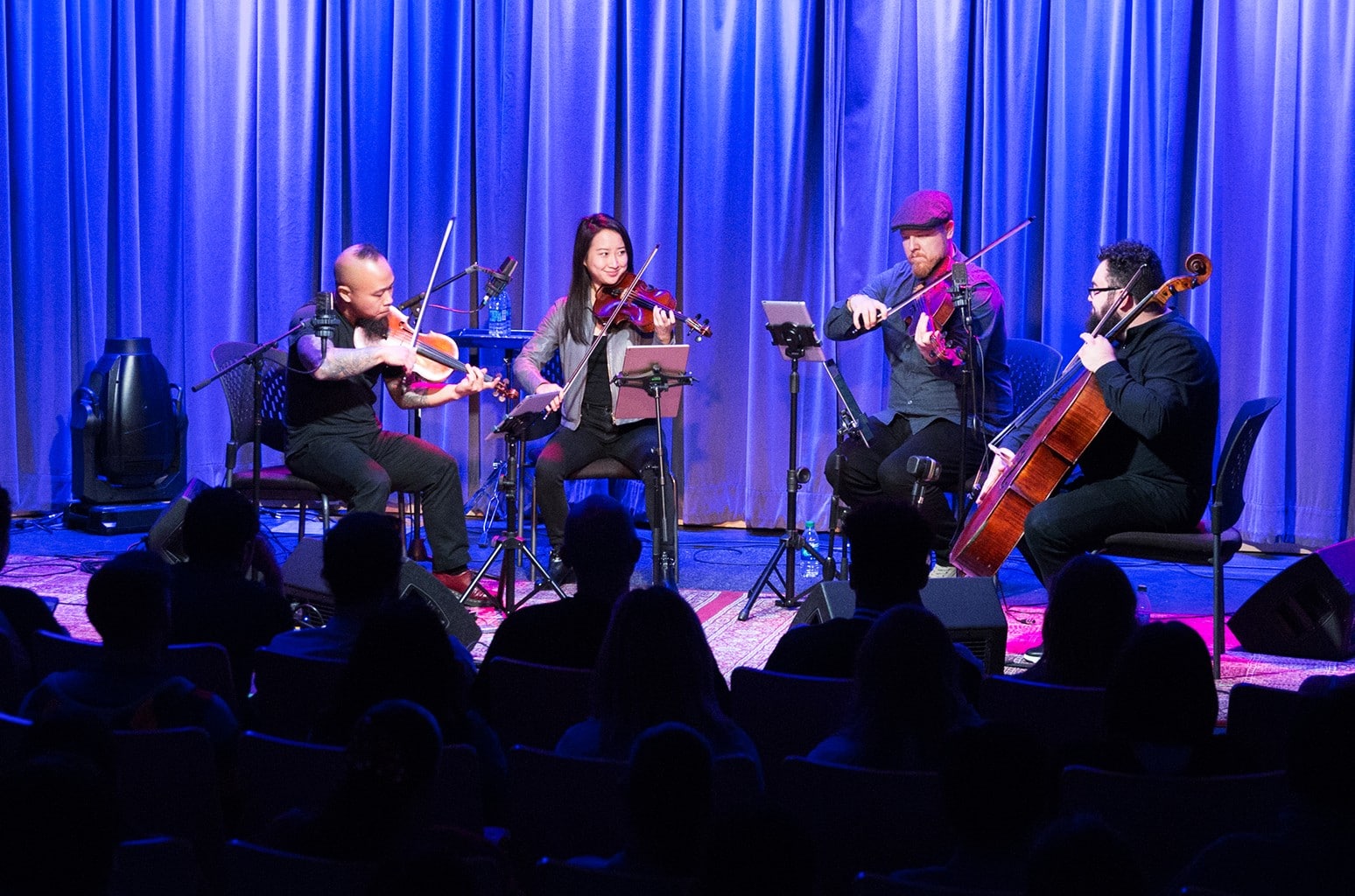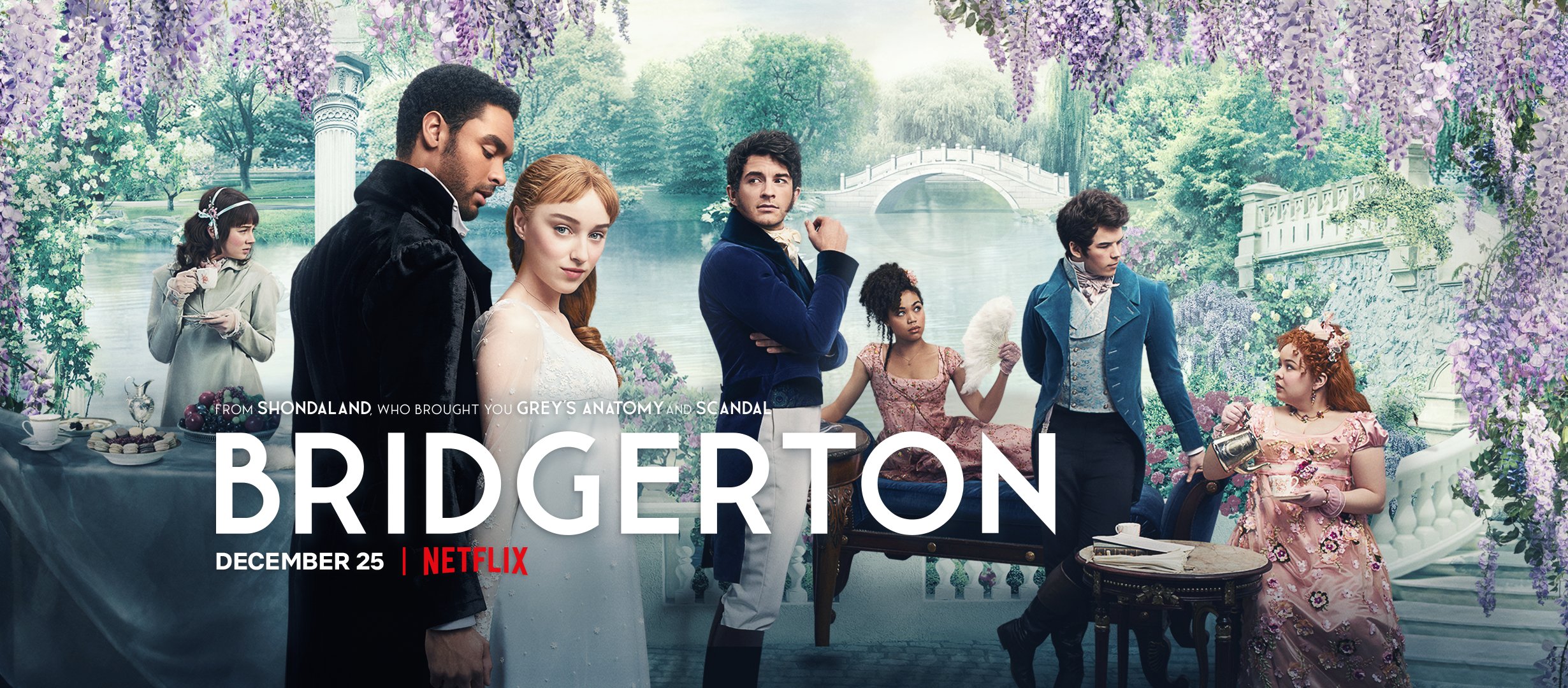Who’s playing in the most famous string quartet of 2021?
mainNetflix has a phenomenal hit on its hands with the English period drama, Bridgerton.
Scorned by critics, it has been watched by more people that The Crown, consigning Downton Abbey to premature oblivion.
All the music in the series is played by a string quartet, mostly as Haydn-like adaptations of recent pop hits, such as Billy Eilish’s Bad Guy and Taylor Swift’s Wildest Dreams.
The group is the Vitamin String Quartet, an ad hoc, interchangeable ensemble managed since 2008 by the CMH label.
The individual musicians are not named on any website, or on Wikipedia.
The violist Tom Tally has been named as one of those involved, but why the secrecy?
Can we identify any more?
Here’s a Billboard picture of a live Vitamin SQ concert in 2018.
Is it not a form a slavery for musicians to be made to work and not credited?

And here’s the hit track.






Phenomenal hit? A drama that nobody dare criticise, more like.
It’s awful.
Not sure I’d want my name on that.
I enjoyed Downton Abbey. I doubt I would have bought the Dowager Duchess of Grantham as black. Bridgerton seems to have tapped into ultra-wokery. Haven’t been able to bring myself to check it out. Colour-blind casting is one thing, but even fictional historicals only work when there is some grounding in reality. I don ‘t think there were many titled blacks floating around in those days.
I agree that TV should be telling black stories, and some of its efforts in that direction, like Small Island, have been very fine. I do not agree that we should be imposing our stories on blacks, whose life at that time was considerably tougher than I understand Bridgerton would have you believe. It seems to me it denigrates what blacks were really living like at the time.
But having already endured one Shonda Rimes series — in the end to see how far off the rails she thought she could take it — I know she has the sensitivity of a sledgehammer.
And very dubious musical taste.
Clicked on this because I thought, not being a Netflixer, it might be about George Bridgetower, the virtuoso mulatto violinist.
Surely history isn’t ‘black stories’ and ‘our stories’ (whoever ‘we’ are)? England, let alone Europe, wasn’t monolithically ‘white’ in the 18th-19th centuries. (See, e.g., https://vanessariley.com/blackpeople.php, on the regency.) Class and culture, in those times, mattered rather more than race, and so they would now, except for the poisoned legacy of slavery in the Americas.
The music clip was just fine – fun, nicely played, and well suited for a fluffy historical romance, which I suppose Bridgerton to be.
The link was very interesting, though the writer clearly has an agenda (and not a bad one). But there is a difference between featuring characters who are black and presenting them in the context of their stories and colour-blind casting, which pretends that black people moved as freely through high and aristocratic society in Regency England as whites. They were NOT titled Englishmen.
Seems to me there are REAL stories of the many blacks in England at the time e.g. movies like Belle — that would be better than placing blacks in obviously white roles that is just acting-as-pretending. All acting IS pretending, of course, but in good properties the actors are pretending to be something they might well have been. This is twisting reality to tick boxes and signal virtue.
Perhaps one way to become less trapped in black/white ideologies of race is to be accepting of a fictional romance that postulates a Georgian black English duke? (A blessed relief from the ‘victim’ syndrome.) If as a result more people become aware (as I am doing) that men and women of African and of Indian sub-continent descent were around in some numbers at different levels of society in 18th-19th century Europe, that can only be good.
Dido Elizabeth Belle is a tip of the iceberg. Her father, the naval officer John Lindsay, had several more liaisons with women of colour in the West Indies, took responsibility for his other offspring, and made provision for their mothers (https://georgianera.wordpress.com/2018/06/26/dido-elizabeth-belle-new-information-about-her-siblings/). How many naval officers of the West Indian service, to say nothing of owners and managers of West Indian plantations, did likewise? Perhaps some, at least. (Miss Lambe in Jane Austen’s Sanditon may be a case in point.)
George Bridgetower’s father was West Indian, his mother German, both were servants of European noble houses (Radziwill, Esterhazy – as was Franz Josef Haydn). How many more black or mulatto servants of European nobility were there (we know about the fashion for black page boys)? How many married their fellow servants, or into the white community? What became of their children?
Those who achieved fame in their own time are the tip of another iceberg.
‘REAL stories’ worry me more when they simply perpetuate and reinforce the current interpretations of history, and therefore the prejudices of today. (But I do love the novels both of Georgette Heyer and of Hilary Mantel!)
And finally – please can the clichéd ‘woke’, ‘tick boxes’ and ‘virtue signalling’ be given a rest?
Robots?
Awful dredge that makes Beverly Housewives seem like Shakespeare.
Of no consequence and should remain anonymous.
How does it compare with the Busch Quartet in the 1930s? The Busch Quatret of that era is my benchmark of string quartet playing. I confess, I have never heard of the Vitamin String Quartet. Congratutations to its promotion management company, however.
I will try to give you an objective appreciation: The sound quality with the Vitamin Str. Q. is audibly better. As for the rest…
If you want to know who they are, go to youtube with a string player who gigs in LA — they’ll tell you (probably.)
Calling it a period drama is a misnomer, since two characters sing the barcarolle from Contes d’Hoffmann, which wasn’t written until several decades later…
Since it’s pseudo-historical sub-sub-Austen, people needn’t get worked up about the multiracial cast. Take it as an alternate-world fantasy, and relax. Or ignore it altogether. (To the extent that there’s any historical aspect at all, it’s being justified by a Moorish line in the historical Queen Charlotte’s ancestry and fantasizes that she desegregated the British aristocracy by fiat, or force of will, or whatever.)
The music like the series itself is inauthentic tosh
Not being credited is tantamount to slavery?????? That’s a new one on me. Zillions of people work very hard and are hardly, if ever, individually publicly credited. But they are paid – which, I think, distinguishes them from slaves. The other thing is that they are free to seek other employment to better their careers. I don’t think that slaves may do this, as they are ‘owned’ by their masters.
Look at the NHS at the moment (though the non-administrators ought to be paid a damn sight more – particularly the nurses who are running colossal risks at this time for a pittance). Look at the teams that created (and are still creating) anti-Covid vaccinations. Look at the individual players in the great orchestras, and choruses mentioned at best at the back of the concert programmes.
Apologies if this unleashes another quasi-political diatribe from our resident politico and collective conscience incarnate, Mr Safford – I’m afraid it might. Just in the faint hope of avoiding this, I’d like to state that the above-mentioned organisations, or at least their chief honchos, are mostly white-dominant and thus imperialist and colonialist, and there should be a full enquiry and enforced diversity.
I actually had no intention of posting to this topic.
But since you gave me such a kind invitation….
NL: “Is it not a form a slavery for musicians to be made to work and not credited?”
You: “Apologies if this unleashes another quasi-political diatribe from our resident politico and collective conscience incarnate, Mr Safford ”
Nope. It’s a rhetorical throwaway line by NL.
Should musicians get name credit? Yes, we should. We don’t often enough. That should be changed. ‘Nuff said.
The more despiccable is the way in which in some ‘history dramas’ the accompanying music is handled: all efforts which went into the visualisation are attempts to make the visuals as convincing as possible, so that the viewer gets a ‘real’ impression of the period, but the music has to be pop music as much as possible because, so goes the ‘thinking’, that is the only type of music that is accessible to modern audiences. A musical accompaniment that is as carefully related to the period, be it classical or entertainment, is deemed ‘too difficult’. It is like Ben Hur with wrist watches and smartphones, and the couple in Gone with the Wind watching Saturday Night Live.
There is a veiled element of gloating in such period dramas, on one hand they want to show the superior tastes of the period (fashion, interior decoration, architecture), on the other the viewer is consoled by seeing those elites are even more unhappy than we are.
https://subterraneanreview.blogspot.com/2015/08/aesthetics-and-misery.html
This, from what I read, has little pretension to being an “historical drama.” It is woke fantasy.
The major historical dramas of the last few decades — a couple of excellent Pride and Prejudices, most of the rest of the Austen canon, Vanity Fair and others, use appropriate (if forgettable) music. Even Downton Abbey, which I gather is is fashionable to sneer at, does not go anachronistic.
Most of the pop music I hear on TV programmes is from contemporary shows, though I have a notion that some historicals have used pop in a vaguely ironic context. (In a film like Baz Luhrman’s R&J, the whole thing is set contemporarily, of course — and it is a surprisingly faithful reading of the play).
There was the ‘historic’ drama serie ‘The Borgias’ with hip pop underneath, which was very silly.
I agree the Austen series were more careful with the music.
The superbly elegant outfit of the young man at the far right in the picture demonstrates how feeling for men´s fashion has deteriorated since Regency.
I looked on wiki and VSQ website as well. Poor form not to have names on records. I was just watching a Musicians Hall of Fame interview on YouTube where the bass player got $40 a session and the singer got millions for a song but without his distinctive bass the song would be just another country song.